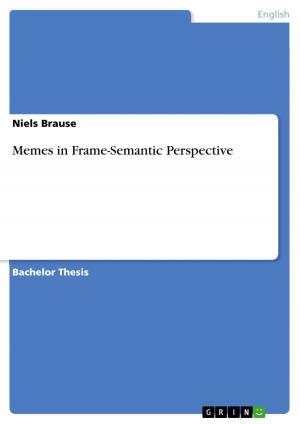Thornton Wilder - 'The Skin of our Teeth'. The female characters of the play
The Skin of our Teeth. The female characters of the play
Nonfiction, Entertainment, Drama, Anthologies| Author: | Isabel Zosig | ISBN: | 9783638249843 |
| Publisher: | GRIN Publishing | Publication: | February 1, 2004 |
| Imprint: | GRIN Publishing | Language: | English |
| Author: | Isabel Zosig |
| ISBN: | 9783638249843 |
| Publisher: | GRIN Publishing |
| Publication: | February 1, 2004 |
| Imprint: | GRIN Publishing |
| Language: | English |
Seminar paper from the year 2003 in the subject American Studies - Literature, grade: 2 (B), University of Bamberg (Centre for British Studies), 10 entries in the bibliography, language: English, abstract: When Wilder's 'The Skin of our Teeth' first came to the stage in 1942, the audience had difficulty understanding the play. Many of them left the theatre before the 3rd Act had started. The audience hadn't shared the same background as Wilder and one could say that they weren't ready for his play yet. However, most of the critics favoured the new play and Wilder received his third Pulitzer Prize for it. 'The Skin of our Teeth' is strongly influenced by Wilder's experience of two World Wars and his visit of English cities, which had been destroyed by German bombs, in 1941, where he was astonished by the 'almost amused bewilderment'1 the British showed whilst facing the disasters of war.2 During the late 1930s Wilder studied the works of James Joyce and admits that 'The Skin of our Teeth' is 'deeply indebted to James Joyce's Finnegans Wake'3, whilst critics called it 'an American re-creation, thinly disguised'4 with reference to the Joycean novel. He borrowed ideas from many other authors like André Obey. A second source of inspiration, every bit as important to 'The Skin of our Teeth' as the highbrow 'Finnegan's Wake', was the lowbrow, popular entertainment of the day: the burlesque. Especially the work of the American comedians Olsen and Johnson shows a certain affinity to Wilder's play. Wilder did not see himself as an innovator, but a man who tried to keep the craft of writing alive. 'I am not an innovator, but a rediscoverer of forgotten goods and I hope a remover of obtrusive bric á brac'5 1 Erwin Häberle, Das szenische Werk Thornton Wilders (Heidelberg 1967) pp. 91 2 ibid. pp. 91-107 3 Thornton Wilder, Our Town and Other Plays (1962) p.14 4 Rex Burbank, Thornton Wilder (Boston 1961), p.101 5 Thorton Wilder, Our Town and Other Plays (1962), p.14
Seminar paper from the year 2003 in the subject American Studies - Literature, grade: 2 (B), University of Bamberg (Centre for British Studies), 10 entries in the bibliography, language: English, abstract: When Wilder's 'The Skin of our Teeth' first came to the stage in 1942, the audience had difficulty understanding the play. Many of them left the theatre before the 3rd Act had started. The audience hadn't shared the same background as Wilder and one could say that they weren't ready for his play yet. However, most of the critics favoured the new play and Wilder received his third Pulitzer Prize for it. 'The Skin of our Teeth' is strongly influenced by Wilder's experience of two World Wars and his visit of English cities, which had been destroyed by German bombs, in 1941, where he was astonished by the 'almost amused bewilderment'1 the British showed whilst facing the disasters of war.2 During the late 1930s Wilder studied the works of James Joyce and admits that 'The Skin of our Teeth' is 'deeply indebted to James Joyce's Finnegans Wake'3, whilst critics called it 'an American re-creation, thinly disguised'4 with reference to the Joycean novel. He borrowed ideas from many other authors like André Obey. A second source of inspiration, every bit as important to 'The Skin of our Teeth' as the highbrow 'Finnegan's Wake', was the lowbrow, popular entertainment of the day: the burlesque. Especially the work of the American comedians Olsen and Johnson shows a certain affinity to Wilder's play. Wilder did not see himself as an innovator, but a man who tried to keep the craft of writing alive. 'I am not an innovator, but a rediscoverer of forgotten goods and I hope a remover of obtrusive bric á brac'5 1 Erwin Häberle, Das szenische Werk Thornton Wilders (Heidelberg 1967) pp. 91 2 ibid. pp. 91-107 3 Thornton Wilder, Our Town and Other Plays (1962) p.14 4 Rex Burbank, Thornton Wilder (Boston 1961), p.101 5 Thorton Wilder, Our Town and Other Plays (1962), p.14















